 “You work for the American dream. You don’t steal it.”
“You work for the American dream. You don’t steal it.”
“This is even better.”
A SIMPLE PLAN is the first Sam Raimi movie not to be easily recognizable as a Sam Raimi movie. It even has a Danny Elfman score that’s not recognizable as a Danny Elfman score. It’s a grim, uncomfortable neo-noir, stylistically subdued, what little humor it has dry enough that it likely doesn’t register with everybody. If anything, it seems most akin to BLOOD SIMPLE by Raimi’s former roommates/CRIMEWAVE co-writers/DARKMAN cameo-ers the Coen Brothers, transplanted to a snowy Minnesota environment more like FARGO.
Like THE QUICK AND THE DEAD it was a for-hire project, but this time he didn’t want it to feel like any of his other movies. He and cinematographer Alar Kivilo (THE LOOKOUT) agreed that the camerawork should be simple, “invisible,” basically the opposite of what everyone loves about his earlier films. I don’t advocate doing that all the time, or even often, or honestly ever again, but here it definitely works for him.
The script is by Scott B. Smith, adapted from his novel. Before the book’s publication in 1993 the movie rights were sold to Mike Nichols. He dropped out to do ALL THE PRETTY HORSES, which ironically ended up being directed by Billy Thornton after he co-starred in this. Ben Stiller was first to take over and rewrite the script with Smith, then post-LAST-SEDUCTION John Dahl came aboard, intending it for his RED ROCK WEST star Nic Cage. But the studio, Savoy, was sold, at which point the project went to John Boorman, who cast Bill Paxton and Thornton in the leads (reuniting them after ONE FALSE MOVE). Raimi took over so last minute that he had to choose from locations already scouted by Boorman. But he was excited for the opportunity to do his most character driven piece to date, and, despite being the EVIL DEAD guy, he reportedly had Smith tone down some of the violence from the book.
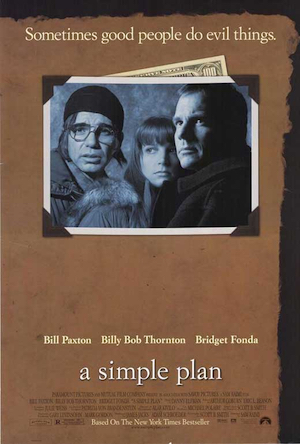 Paxton (right after TITANIC) stars as Hank Mitchell, an accountant for a rural Minnesota feed mill. He and his librarian wife Sarah (Bridget Fonda, not long after JACKIE BROWN) are expecting their first child. Things seem good.
Paxton (right after TITANIC) stars as Hank Mitchell, an accountant for a rural Minnesota feed mill. He and his librarian wife Sarah (Bridget Fonda, not long after JACKIE BROWN) are expecting their first child. Things seem good.
Hank’s brother Jacob (Billy Bob Thornton right before ARMAGEDDON) didn’t go to college like Hank did, has less money, less of what would outwardly be seen as “a life.” They spend time together but there’s some tension, especially when Jacob brings his buddy Lou (Brent Briscoe, who had also been in GHOST BRIGADE, SLING BLADE and U TURN with Thornton), who’s introduced mooning Hank and is clearly resentful of him. Hank doesn’t get their jokes and references, he’s uptight about them drinking, Lou says “he runs like my wife.” And for some reason Lou took it personally that Hank used the word “insinuating” in front of him months ago. Says he was “putting on airs” by using what he sees as a fancypants word.
It’s also clear that Sarah doesn’t like Jacob much, and that Jacob knows it, and tip toes around her. When he comes over to their house he makes a big show that he remembered to take his shoes off and that he wore a button up shirt, showing it to her and saying, “Ta da!” I think he sincerely wants to please her, though he also wants credit for his efforts.
With his stringy hair, Chop Top teeth and thick glasses taped together with duct tape, Jacob seems like he should be a grotesque figure. Instead he’s the most likable character in the movie. His life is so tragic but he tries to smile and laugh through it – it takes alot to break him. (But it will happen.)
It’s a very dark and powerfully uncomfortable movie, and terrible things happen to many characters, some in over their heads, some totally innocent. But for me the saddest part is when Jacob tells his brother that he’s never been in a relationship. Hank pathetically tries to comfort him by bringing up one high school girlfriend, but Jacob reveals that girl only went out with him for a month to win a $100 bet.
I mean that’s terrible, but the kicker is the positive spin he puts on it. “But it was cool. When the month was over, she, uh, you know, kinda would say hi to me sometimes in the hallway when I’d see her. She didn’t have to do that. That was cool of her.”
Of course, this is not just a family drama. One day Hank, Jacob and Lou find the wreckage of a small plane buried in the snow in some woods. The pilot has clearly been dead for a while and there’s a bag with more than $4 million inside. Hank wants to tell the police, Jacob and Lou want to take the money, and of course there’s an, uh, insinuation of “we could use this fuckin money, college boy, just shut up and let us take it.” Eventually they agree to a plan of Hank hiding the money until the end of winter. If they don’t hear about anybody looking for the money by then they figure it’ll be safe to keep it and they’ll split it up.
So now our stomachs tighten as we watch these idiots make every possible mistake, and not in the humorous manner of many Coen Brothers movies. Like, right when they’re leaving Sheriff Carl (Chelcie Ross, ABOVE THE LAW, BILL & TED’S BOGUS JOURNEY, THE LAST BOY SCOUT) stops to check on them, Hank says he’ll do the talking and then Jacob decides to come over and say that they heard a plane flying over. What the fuck, Jacob!?
Though it’s not Hank’s fault that Lou has an inferiority complex around him, Hank actually does feel superior. We knows this because he lectures Lou about how they can’t tell anyone about the money, not even their wives, complains that Lou is gonna tell his wife, then goes home and immediately tells his own. (Lou does not.) When Hank asks Sarah hypothetically what she’d do if she found a bunch of money she keeps saying she’d turn it in to the police. Eventually she says, “Hank. I mean, this is really silly. Obviously you want me to say something in particular. I don’t know what it is, but you want me to agree with you or say that you’re right or something. But I wouldn’t take it. That’s just me. I wouldn’t.”
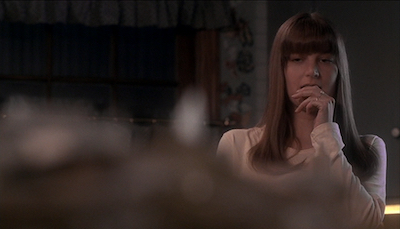 Her eyes sure do get big though when he dumps it all on the table in front of her. (Having it out of focus in the foreground as she looks at it is about as close to a Raimi-esque shot is we get here.) There’s definitely some lust on her face. Still, she says, “You’ve got a good job. We don’t need it.”
Her eyes sure do get big though when he dumps it all on the table in front of her. (Having it out of focus in the foreground as she looks at it is about as close to a Raimi-esque shot is we get here.) There’s definitely some lust on her face. Still, she says, “You’ve got a good job. We don’t need it.”
Then in the middle of the night she wakes up and tells him to return $500,000 of it to the plane so that whoever finds it doesn’t know there was more of it. Innocent lady who wouldn’t take the money turning into a master schemer in a matter of hours. That’s just her.
I suppose this could be considered the titular simple plan, and man do they fuck it up. Hank leaves Jacob as lookout by the truck, but Jacob freaks out when an old farmer named Dwight (Tom Carey) comes by on a snowmobile. Hank returns just in time to see Jacob across the field hitting Dwight over the head with a tire iron. Okay, great, now we’re murderers.
Hank immediately knows what to do to protect his brother. He takes the body and the snowmobile, drives them off a bridge to seem like an accident. Much like with his wife, it’s disturbing how quickly he could jump into criminal mastermind mode. But it’s worse than that. On the way there he discovers that Dwight is still breathing. So he suffocates him. Jacob, in his panic, had said, “We can probably do that CPR deal,” and here’s Hank doing the opposite.
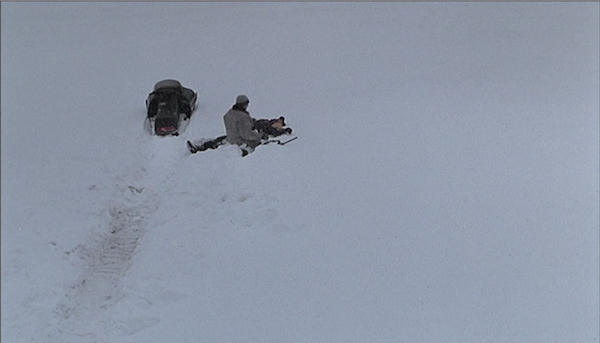
Whenever I rewatch this I’m surprised how quickly the plan goes this awry. At first Hank seems like the audience’s surrogate, the more reasonable guy who has been tempted into doing the wrong thing, but is trying to remain a good person. Then only about a quarter of the way in he’s already become the worst of them. To Jacob’s credit he intends to go confess to killing Dwight until Hank reveals that he finished him off and would be the one to go down for it.
Throughout the movie, Hank also loses some of the illusions he has about his and Jacob’s lives. There’s an awkward moment when they’re bringing poinsettias to their parents’ graves (shades of NIGHT OF THE LIVING DEAD), Hank is confused about some flowers that couldn’t have been from last year and it becomes clear that Jacob comes there on his own all the time and Hank is the asshole who only goes once a year. It definitely never occurred to him that he could go other times or that Jacob might.
Hank also has no clue that, at least according to Jacob, their dad crashed his car as a suicide, because he lost the farm. Or that he lost the farm because he paid for Hank to go to college. Or that since Jacob did not have college paid for him he was supposed to inherit the farm that Hank now says he can’t buy back because it will give away that they found the money.
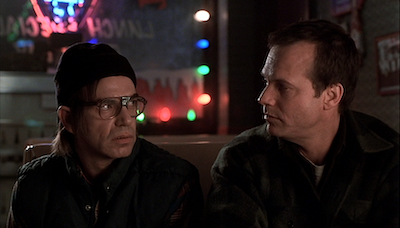 Many of the big suspense sequences are built on conversational tension, especially a long stretch after Sarah convinces Hank to get Lou drunk and record him fake-confessing to the murder. She suddenly turns to Hank and tells him to do this while holding their baby for the first time – that’s what’s been on her mind while giving birth! They go out drinking, move from the bar to Lou’s house, with Jacob seeming more and more unhappy with the plan, seeming like he’s gonna back out. Lou actually decides he likes Hank and shakes his hand, and the glare Jacob gives Hank for leading him on like this is torturous.
Many of the big suspense sequences are built on conversational tension, especially a long stretch after Sarah convinces Hank to get Lou drunk and record him fake-confessing to the murder. She suddenly turns to Hank and tells him to do this while holding their baby for the first time – that’s what’s been on her mind while giving birth! They go out drinking, move from the bar to Lou’s house, with Jacob seeming more and more unhappy with the plan, seeming like he’s gonna back out. Lou actually decides he likes Hank and shakes his hand, and the glare Jacob gives Hank for leading him on like this is torturous.
The way Jacob loosens Lou up is to tease Hank. Lou loves Jacob’s imitation of Hank running across the snow “like a quail.” Hank is clearly hurt to realize that they laugh about him behind his back all the time. So Jacob puts his brother though the wringer but then he betrays his friend just like he said he would.
And poor Lou, man. I mean, he’s a jackass, but I kinda feel for him. Jeez, that scene where he knocks on Lou’s door at night begging for his share, saying he’s broke. After resisting for a bit Hank tells him to hang on for a second, goes out of the room like he’s getting something, comes back and gives him $40. Jesus christ.
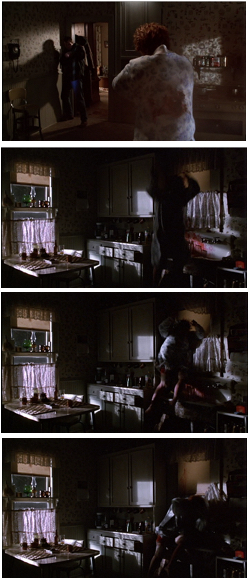 Oh yeah, and worse than that, Jacob ends up shooting him. His blood sprays right onto his wife Nancy (Becky Ann Baker, THE PROTECTOR)’s face. That’s one of the few “oh yeah, this is directed by Sam Raimi” moments, the main one being just after that when Hank tries to stop her from getting a gun and ends up shooting her. She goes flying across the kitchen and hits the wall like it’s THE QUICK AND THE DEAD or Ash fighting the pit witch. A hell of an exclamation point in the middle of this movie.
Oh yeah, and worse than that, Jacob ends up shooting him. His blood sprays right onto his wife Nancy (Becky Ann Baker, THE PROTECTOR)’s face. That’s one of the few “oh yeah, this is directed by Sam Raimi” moments, the main one being just after that when Hank tries to stop her from getting a gun and ends up shooting her. She goes flying across the kitchen and hits the wall like it’s THE QUICK AND THE DEAD or Ash fighting the pit witch. A hell of an exclamation point in the middle of this movie.
(Less specifically Raimi-esque, but worth mentioning, is the part where Hank climbs in the plane, sees the back of the pilot’s head and thinks he’s still alive, but then learns that he’s moving because crows are eating his eyeballs. They are real crows eating a dummy perhaps made by Raimi vets Howard Berger and Robert Kurtzman. Other shots use fake birds puppeteered by Mike Deak, who had puppeteered skeletons in ARMY OF DARKNESS.)
Though Raimi didn’t want us to notice his camerawork in this one, there’s a particular placement that really stands out to me as brilliant. After shooting Lou and Nancy, Hank calls the police from their phone to fake some sort of drunken domestic incident going down. After he hangs up he goes into the other room, wipes his fingerprints off of the shotgun and touches the late Lou’s fingers to it. But Raimi doesn’t have the camera follow him or cut to an angle from inside the other room. Instead he leaves the camera in the hallway by the phone, just watching him. I feel like the camera is giving Hank that ice cold Jacob glare as it sees him so easily transition from guy-trying-to-set-up-Lou-to-protect-himself to guy-covering-up-the-murders-of-Lou-and-Nancy.
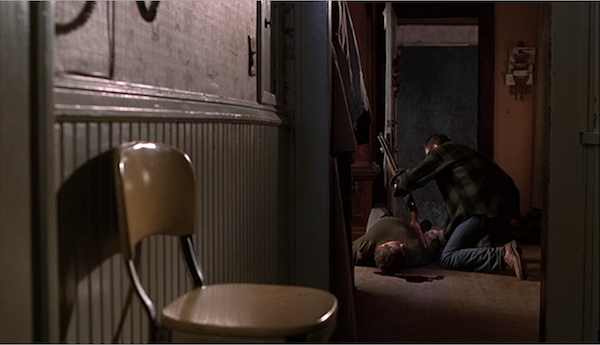
It’s definitely not Jacob’s P.O.V. We know that because he’s down in the (quite EVIL DEAD looking) basement, sitting on the stairs, brooding when Hank comes down, puts his arm around him and says, “Come on, we can make this work.”
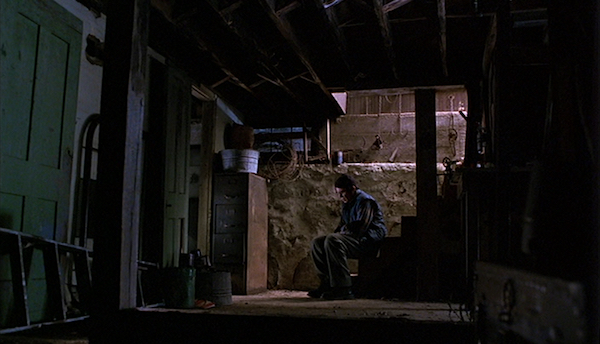
And things still get more tense with the arrival of Agent Baxter of the FBI, who Sarah suspects might actually be one of the criminals the money belongs to. He’s played by Gary Cole, who was known for playing Mike Brady in THE BRADY BUNCH MOVIE and A VERY BRADY SEQUEL, but had also been scary as fuck as a demonic sheriff in the short-lived Raimi/Renaissance Pictures produced TV show American Gothic.
At the beginning of the movie Hank and Sarah consider themselves good people. Then they slide to describing themselves merely as people who are perceived as good people. That’s the reason Hank gives for why everyone would supposedly take his word over Lou’s. And Sarah says no one will ever suspect Hank for the murders because “You’ve gotta remember how people see you. You’re just a normal guy, a nice, sweet, normal guy.”
“They’re gonna know.”
“No they won’t. Nobody would ever believe that you’d be capable of doing what you’ve done.”
Gee, thanks.
Hank’s perceived normal, nice, sweet guyness actually works against Agent Baxter, who, when confronted with a gun, confidently says “But you’re not the cold-blooded type, are you Mr. Mitchell?” and promptly gets shot in cold blood. It’s actually just like when Darkman was told he could never live with himself but he was in fact learning to live with alot of things.
Paxton is so great in this. I don’t know how to rank it against a comedic role like THE DARK BACKWARD, but I think it may be his best performance. So many great uncomfortable looks on his face. Sitting between Lou and Jacob in the truck, looking back and forth as they joke, half smiling like he’s trying to be part of it, but obviously feeling a little left out.
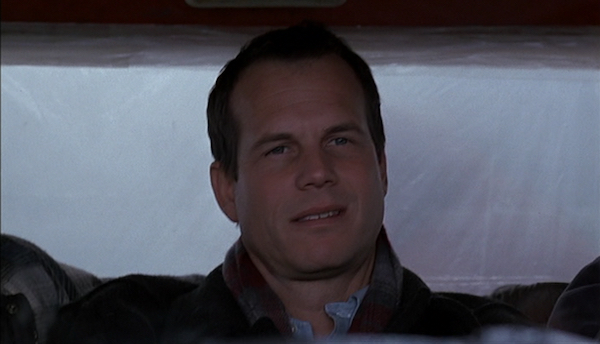
Or when drunk and depressed Jacob asks, “Hank, do you ever feel evil?” and this is Hank’s response:
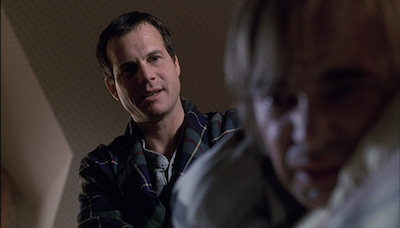
After Fonda was turned down for DARKMAN and then did that cameo as Linda in ARMY OF DARKNESS it’s nice that she got to play a much better character in a Raimi movie – not a better person than DARKMAN’s Julie, but one that’s more interesting to watch. There’s an odd sort of equality to the fact that she gets to be just as corrupted as Hank. It’s easy to imagine the pregnant wife being the moral center who is greatly disappointed in what her husband does. That might be comforting, but it’s much more powerful drama that she goes from “You’ve got a good job. We don’t need it” to forbidding him from returning the money and bitterly chewing him out about not wanting to work at a library and have to clip coupons for the rest of her life. Even aside from all the deaths and guilt, these people would’ve been so much happier if they’d just never known there was a possibility of having more money. Just knowing it’s there destroys them. It makes you feel so bad about humanity. (And you’re telling me the book is darker?)
I guess that’s the reason for all the animal imagery. We’re all animals, aren’t we? The first shot is a close up of a crow’s eye, then we see a fox invading a hen house. This little thief is later in the road causing Jacob to swerve, in turn causing his dog Mary Beth to run off, leading them to the plane.
There are many crows hanging around, and I suppose it’s a little corny how much it underlines that Hank, Jacob and Lou are scavengers, stealing from the dead. But it’s worth it for Jacob looking up at the crows and saying, “Those things are always waitin on something to die so they can eat it, right? What a weird job.”
Although Raimi had had plenty of acclaim throughout his career, this must’ve been the first time a critic (John Simon of the National Review) wrote that his “dialogue and characterization are rich in detail.” Roger Ebert called it “one of the year’s best films” in a review that Metacritic rates at 100%. A SIMPLE PLAN was also a career breakthrough for Raimi in that it was nominated for two Oscars – supporting actor for Thornton and adapted screenplay for Smith. (They lost to James Coburn for AFFLICTION and Bill Condon for GOD AND MONSTERS. What are ya gonna do?)
The high quality and great reception of A SIMPLE PLAN felt like a victory for Raimi and fans of his work. See, he can do one of your serious big boy movies. And do it better than most. Take that, motherfuckers.
But that posed a scary question. Was he just gonna make movies like this now?


























January 20th, 2022 at 12:50 pm
I actually watched that in theatres. It was the first movie I saw in our back then brand new multiplex. I was also recovering from a cough and probably annoying the shit of the handful of other moviegoers with my constant throat clearing. Sure, the lack of Raimi-isms was a bit disappointing to me, but this is such a tight movie, it didn’t matter to me.